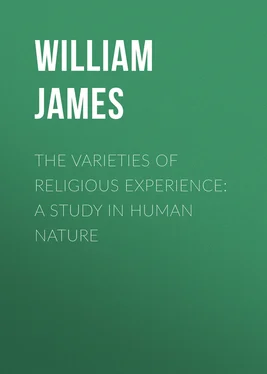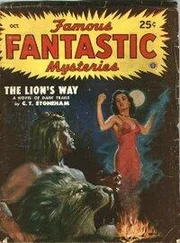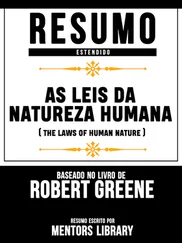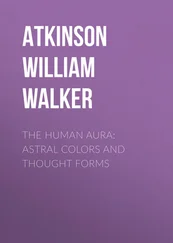William James - The Varieties of Religious Experience - A Study in Human Nature
Здесь есть возможность читать онлайн «William James - The Varieties of Religious Experience - A Study in Human Nature» — ознакомительный отрывок электронной книги совершенно бесплатно, а после прочтения отрывка купить полную версию. В некоторых случаях можно слушать аудио, скачать через торрент в формате fb2 и присутствует краткое содержание. Жанр: foreign_prose, foreign_religion, Философия, foreign_psychology, foreign_antique, на английском языке. Описание произведения, (предисловие) а так же отзывы посетителей доступны на портале библиотеки ЛибКат.
- Название:The Varieties of Religious Experience: A Study in Human Nature
- Автор:
- Жанр:
- Год:неизвестен
- ISBN:нет данных
- Рейтинг книги:4 / 5. Голосов: 1
-
Избранное:Добавить в избранное
- Отзывы:
-
Ваша оценка:
- 80
- 1
- 2
- 3
- 4
- 5
The Varieties of Religious Experience: A Study in Human Nature: краткое содержание, описание и аннотация
Предлагаем к чтению аннотацию, описание, краткое содержание или предисловие (зависит от того, что написал сам автор книги «The Varieties of Religious Experience: A Study in Human Nature»). Если вы не нашли необходимую информацию о книге — напишите в комментариях, мы постараемся отыскать её.
The Varieties of Religious Experience: A Study in Human Nature — читать онлайн ознакомительный отрывок
Ниже представлен текст книги, разбитый по страницам. Система сохранения места последней прочитанной страницы, позволяет с удобством читать онлайн бесплатно книгу «The Varieties of Religious Experience: A Study in Human Nature», без необходимости каждый раз заново искать на чём Вы остановились. Поставьте закладку, и сможете в любой момент перейти на страницу, на которой закончили чтение.
Интервал:
Закладка:
53
It remains to be seen whether the school of Mr. Dresser, which assumes more and more the form of mind-cure experience and academic philosophy mutually impregnating each other, will score the practical triumphs of the less critical and rational sects.
54
The theistic explanation is by divine grace, which creates a new nature within one the moment the old nature is sincerely given up. The pantheistic explanation (which is that of most mind-curers) is by the merging of the narrower private self into the wider or greater self, the spirit of the universe (which is your own “subconscious” self), the moment the isolating barriers of mistrust and anxiety are removed. The medico-materialistic explanation is that simpler cerebral processes act more freely where they are left to act automatically by the shunting-out of physiologically (though in this instance not spiritually) “higher” ones which, seeking to regulate, only succeed in inhibiting results.—Whether this third explanation might, in a psycho-physical account of the universe, be combined with either of the others may be left an open question here.
55
Within the churches a disposition has always prevailed to regard sickness as a visitation; something sent by God for our good, either as chastisement, as warning, or as opportunity for exercising virtue, and, in the Catholic Church, of earning “merit.” “Illness,” says a good Catholic writer (P. Lejeune: Introd. à la Vie Mystique, 1899, p. 218), “is the most excellent of corporeal mortifications, the mortification which one has not one's self chosen, which is imposed directly by God, and is the direct expression of his will. ‘If other mortifications are of silver,’ Mgr. Gay says, ‘this one is of gold; since although it comes of ourselves, coming as it does of original sin, still on its greater side, as coming (like all that happens) from the providence of God, it is of divine manufacture. And how just are its blows! And how efficacious it is!… I do not hesitate to say that patience in a long illness is mortification's very masterpiece, and consequently the triumph of mortified souls.’ ” According to this view, disease should in any case be submissively accepted, and it might under certain circumstances even be blasphemous to wish it away.
Of course there have been exceptions to this, and cures by special miracle have at all times been recognized within the church's pale, almost all the great saints having more or less performed them. It was one of the heresies of Edward Irving, to maintain them still to be possible. An extremely pure faculty of healing after confession and conversion on the patient's part, and prayer on the priest's, was quite spontaneously developed in the German pastor, Joh. Christoph Blumhardt, in the early forties and exerted during nearly thirty years. Blumhardt's Life by Zündel (5th edition, Zurich, 1887) gives in chapters ix., x., xi., and xvii. a pretty full account of his healing activity, which he invariably ascribed to direct divine interposition. Blumhardt was a singularly pure, simple, and non-fanatical character, and in this part of his work followed no previous model. In Chicago to-day we have the case of Dr. J. A. Dowie, a Scottish Baptist preacher, whose weekly “Leaves of Healing” were in the year of grace 1900 in their sixth volume, and who, although he denounces the cures wrought in other sects as “diabolical counterfeits” of his own exclusively “Divine Healing,” must on the whole be counted into the mind-cure movement. In mind-cure circles the fundamental article of faith is that disease should never be accepted. It is wholly of the pit. God wants us to be absolutely healthy, and we should not tolerate ourselves on any lower terms.
56
Edwards, from whose book on the Revival in New England I quote these words, dissuades from such a use of prayer, but it is easy to see that he enjoys making his thrust at the cold dead church members.
57
H. W. Dresser: Voices of Freedom, 46.
58
Dresser: Living by the Spirit, 58.
59
Dresser: Voices of Freedom, 33.
60
Trine: In Tune with the Infinite, p. 214.
61
Trine: p. 117.
62
Quoted by Lejeune: Introd. à la Vie Mystique, 1899, p. 66.
63
Henry Wood: Ideal Suggestion through Mental Photography, pp. 51, 70 (abridged).
64
See Appendix to this lecture for two other cases furnished me by friends.
65
Whether the various spheres or systems are ever to fuse integrally into one absolute conception, as most philosophers assume that they must, and how, if so, that conception may best be reached, are questions that only the future can answer. What is certain now is the fact of lines of disparate conception, each corresponding to some part of the world's truth, each verified in some degree, each leaving out some part of real experience.
66
Tract on God, Man, and Happiness, Book ii. ch. x.
67
Commentary on Galatians, Philadelphia, 1891, pp. 510-514 (abridged).
68
Molinos: Spiritual Guide, Book II., chaps. xvii., xviii. (abridged).
69
I say this in spite of the monistic utterances of many mind-cure writers; for these utterances are really inconsistent with their attitude towards disease, and can easily be shown not to be logically involved in the experiences of union with a higher Presence with which they connect themselves. The higher Presence, namely, need not be the absolute whole of things, it is quite sufficient for the life of religious experience to regard it as a part, if only it be the most ideal part.
70
Cf. J. Milsand: Luther et le Serf-Arbitre, 1884, passim .
71
He adds with characteristic healthy-mindedness: “Our business is to continue to fail in good spirits.”
72
The God of many men is little more than their court of appeal against the damnatory judgment passed on their failures by the opinion of this world. To our own consciousness there is usually a residuum of worth left over after our sins and errors have been told off—our capacity of acknowledging and regretting them is the germ of a better self in posse at least. But the world deals with us in actu and not in posse : and of this hidden germ, not to be guessed at from without, it never takes account. Then we turn to the All-knower, who knows our bad, but knows this good in us also, and who is just. We cast ourselves with our repentance on his mercy: only by an All-knower can we finally be judged. So the need of a God very definitely emerges from this sort of experience of life.
73
E.g., Iliad, XVII. 446: “Nothing then is more wretched anywhere than man of all that breathes and creeps upon this earth.”
74
E.g., Theognis, 425-428: “Best of all for all things upon earth is it not to be born nor to behold the splendors of the Sun; next best to traverse as soon as possible the gates of Hades.” See also the almost identical passage in Œdipus in Colonus, 1225.—The Anthology is full of pessimistic utterances: “Naked came I upon the earth, naked I go below the ground—why then do I vainly toil when I see the end naked before me?”—“How did I come to be? Whence am I? Wherefore did I come? To pass away. How can I learn aught when naught I know? Being naught I came to life: once more shall I be what I was. Nothing and nothingness is the whole race of mortals.”—“For death we are all cherished and fattened like a herd of hogs that is wantonly butchered.”
Читать дальшеИнтервал:
Закладка:
Похожие книги на «The Varieties of Religious Experience: A Study in Human Nature»
Представляем Вашему вниманию похожие книги на «The Varieties of Religious Experience: A Study in Human Nature» списком для выбора. Мы отобрали схожую по названию и смыслу литературу в надежде предоставить читателям больше вариантов отыскать новые, интересные, ещё непрочитанные произведения.
Обсуждение, отзывы о книге «The Varieties of Religious Experience: A Study in Human Nature» и просто собственные мнения читателей. Оставьте ваши комментарии, напишите, что Вы думаете о произведении, его смысле или главных героях. Укажите что конкретно понравилось, а что нет, и почему Вы так считаете.












